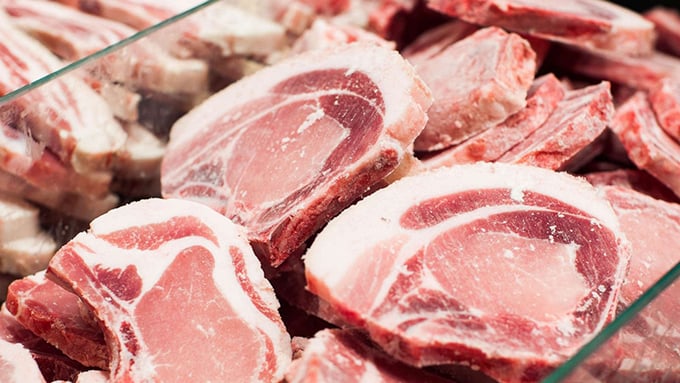December 17, 2025 | 09:24 GMT +7
December 17, 2025 | 09:24 GMT +7
Hotline: 0913.378.918
December 17, 2025 | 09:24 GMT +7
Hotline: 0913.378.918
According to the customs authorities, in the first month of this year, Vietnam imported pork from 13 markets, with Russia being the largest supplier, accounting for nearly 45% of total imports. The average price of frozen pork imported into Vietnam was USD 2,672 per ton, up 20.8% compared to the same period last year.

The decline in restocking has led to limited supply, forcing importers to increase imports to compensate.
Frozen pork is the fastest-growing imported product in the meat and meat products category. By the end of January, Vietnam had imported 74,450 tons of meat and meat products, valued at nearly USD 157 million, marking an 8.2% increase in volume and a 13.4% increase in value compared to the previous month. The main imported products include frozen poultry meat and edible by-products, fresh and frozen buffalo meat, and frozen by-products from pigs, buffalo, and cattle.
The sharp rise in imports is driven by the continuous increase in domestic live pig prices. In February, live pig prices ranged from VND 72,000 to 80,000 per kg, up by VND 6,000 - 10,000 per kg compared to the previous month. A decline in restocking has led to limited supply, forcing importers to increase imports to compensate.
According to the Ho Chi Minh City Department of Finance, contrary to the usual post-Tet price decline, live pig prices have increased this year due to supply shortages. The prolonged African swine fever outbreak has led many companies to reduce their sow herds or face a shortage of market-ready pigs, keeping pork prices high.
Live pig prices are expected to continue rising due to limited supply. While businesses have made efforts to stabilize prices, to ensure long-term operations, the Task Force and enterprises have agreed to adjust the market stabilization price for pork, increasing by VND 5,000 - 13,000 per kg, with an average rise of VND 8,000 per kg. The average adjustment rate is 6.9%, lower than the increase in live pig prices.
Translated by Kieu Chi

(VAN) The seafood industry is aiming for an export goal of USD 10.7 billion in 2025. However, resolving bottlenecks regarding data and green finance is an urgent requirement.

(VAN) Exports of ornamental fish generate nearly USD 15 million annually for Ho Chi Minh City, affirming the sector's position as a distinctive economic component of the city's modern urban agriculture structure.

(VAN) Lang Son agricultural products are upgrading planting-area standards, increasing deep processing, and expanding linkages to move toward sustainable exports.

(VAN) Despite numerous challenges, Vietnam's key seafood products are maintaining strong momentum, setting the stage for full-year exports to potentially reach USD 11 billion.

(VAN) The signing of a protocol between Viet Nam and China on the export of fresh jackfruit represents a significant milestone in agricultural trade cooperation between the two countries.

(VAN) On November 27, the Ninh Binh Department of Agriculture and Environment and the Institute for Green Growth Research organized a training course on greenhouse gas inventory for businesses.

(VAN) China’s cooking oil is suddenly flooding into India. It all comes down to a soybean surplus that Beijing doesn’t quite know what to do with.